Interoperability In Healthcare
- Home
- Interoperability In Healthcare
INTEROPERABILITY IN HEALTHCARE ADVANCING PATIENT CARE
Interoperability helps clinicians deliver safe, effective, patient-centered car
Trusted by:




years of Development Experience
Case studies
Professionals
projects delivered
Leading Interoperability Solutions Provider
At Taction Software, we understand the critical importance of interoperability in healthcare. Our mission is to provide cutting-edge solutions that enable seamless access, exchange, and integration of health data across various systems, applications, and devices. With over a decade of experience in healthcare software development, we specialize in delivering interoperability solutions that optimize the health of individuals and populations globally.
Four Levels of Interoperability
Foundational (Level 1): Establishes inter-connectivity requirements for secure communication between systems.
Structural (Level 2): Defines the format, syntax, and organization of data exchange.
Semantic (Level 3): Provides common underlying models and standardized definitions for shared understanding.
Organizational (Level 4): Includes governance, policy, and legal considerations to facilitate secure and timely communication.

Interoperability in Healthcare Solutions

Better Data Analytics
Duis aute irure dolor in reprehenderit in voluptate velit esse cillum dolore eu fugiat nulla pariatur. Excepteur sint occaecat cupidatat non proident

EHR Integration
Connects Electronic Health Records seamlessly, allowing healthcare providers to easily share patient information for improved care coordination

Standardized Data Formats
Implements standardized formats (HL7, FHIR, C-CDA) for exchanging health data, ensuring compatibility and accuracy across systems.

Interoperable Medical Devices
Integrates medical devices with EHRs and applications, allowing real-time data capture and analysis for more informed clinical decisions

Telehealth & Remote Monitoring
Creates telehealth and remote monitoring solutions, enabling remote patient care delivery and improved patient engagement

Patient Portals
Provides secure patient portals where individuals can access their health information, schedule appointments, and participate actively in their care journey.


Interoperable Analytics Platforms
Deploys interoperable analytics platforms that aggregate data from various sources, generating valuable insights for better clinical decisions and population health management.

Public Health Integration
Integrates with public health systems to facilitate reporting of diseases, syndromic surveillance, and population health initiatives.

Compliance & Security Solutions
Implements robust compliance and security measures (HIPAA, GDPR) to ensure the confidentiality, integrity, and privacy of exchanged health data.
Remote Patient Monitoring Development Services
Real-Time Tracking Of Health Vitals With Remote Monitoring System
Health Data Analytics And Reporting With Remote Patient Monitoring
Patient Engagement Using Medical Remote Monitoring Platform
24X7 Support
OUR BESPOKE HEALTHCARE APPLICATION DEVELOPMENT PROCESS
Design & Prototype & Prototype
Develop wireframes and user interface following prototype creation and usability testing.
Build
We perform unit testing and code control after developing the SaaS application
Test
Perform load, special, and automated testing on application for multiple browsers and OS.
Testing
As a part of testing, we use a variety of testing techniques and quality assurance, including both automated and manual testing, as part of the development process to ensure that the final product is flawlessly free of errors.
Deployment
After performing the testing process,we will beta deploy and live the application.
Maintenance
After deploying the application,we will give you 24/7 support,monitor the application, taking feedback from the clients, and analyze the feedback and work on it.
Testimonials

Developing Mobile App Using Today's Technologies & Tools

Python

Java

C++

React Native
Flutter

Laravel

PHP

HTML
Answering your Healthcare development queries (FAQ)
If you are still thinking about opting for Homestead as a loving home for your loved ones, you can always check out the common queries about our service and support.
Interoperability in healthcare refers to the ability of different information systems, devices, and applications to seamlessly exchange and use data in a coordinated manner to improve patient care and outcomes.
Interoperability ensures that patient health information can be accessed and shared across various healthcare systems and platforms, leading to enhanced care coordination, reduced medical errors, and improved efficiency.
Interoperability enables healthcare providers to access comprehensive patient data from different sources, facilitating informed decision-making, streamlined workflows, and better patient outcomes.
Interoperability solutions can integrate Electronic Health Record (EHR) systems, Health Information Exchange (HIE) platforms, medical devices, telehealth solutions, patient portals, and more
Interoperability solutions incorporate robust security measures, such as encryption, access controls, and compliance with regulatory standards like HIPAA and GDPR, to protect the confidentiality and integrity of patient data.
Yes, interoperability solutions can facilitate the integration of remote patient monitoring devices and platforms, allowing healthcare providers to monitor patients’ health remotely and intervene when necessary.
Common standards such as HL7, FHIR, DICOM, and C-CDA are often utilized in interoperability solutions to ensure data consistency, compatibility, and seamless exchange between systems.
Healthcare organizations can implement interoperability solutions through collaboration with experienced software vendors or developers who specialize in healthcare IT, ensuring that the solutions meet their specific interoperability needs and requirements.
















